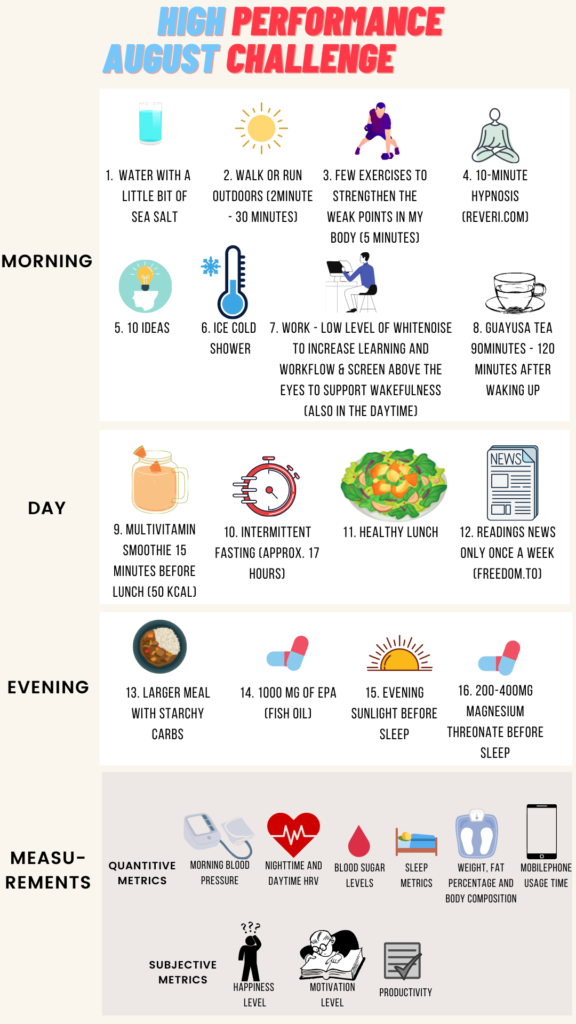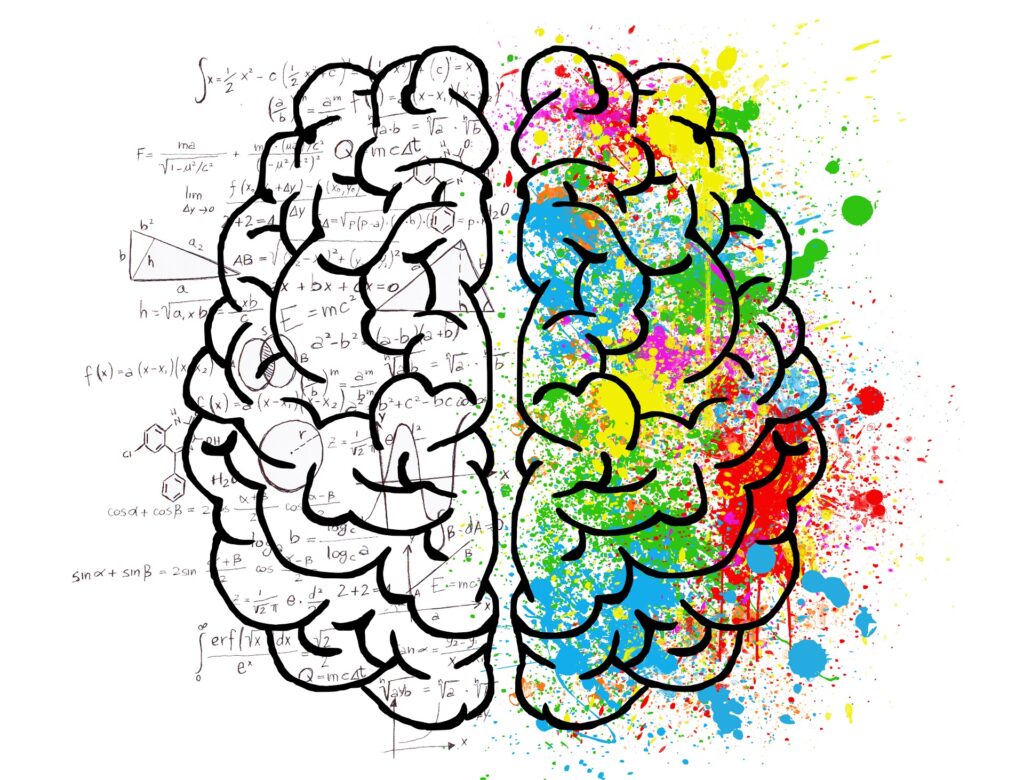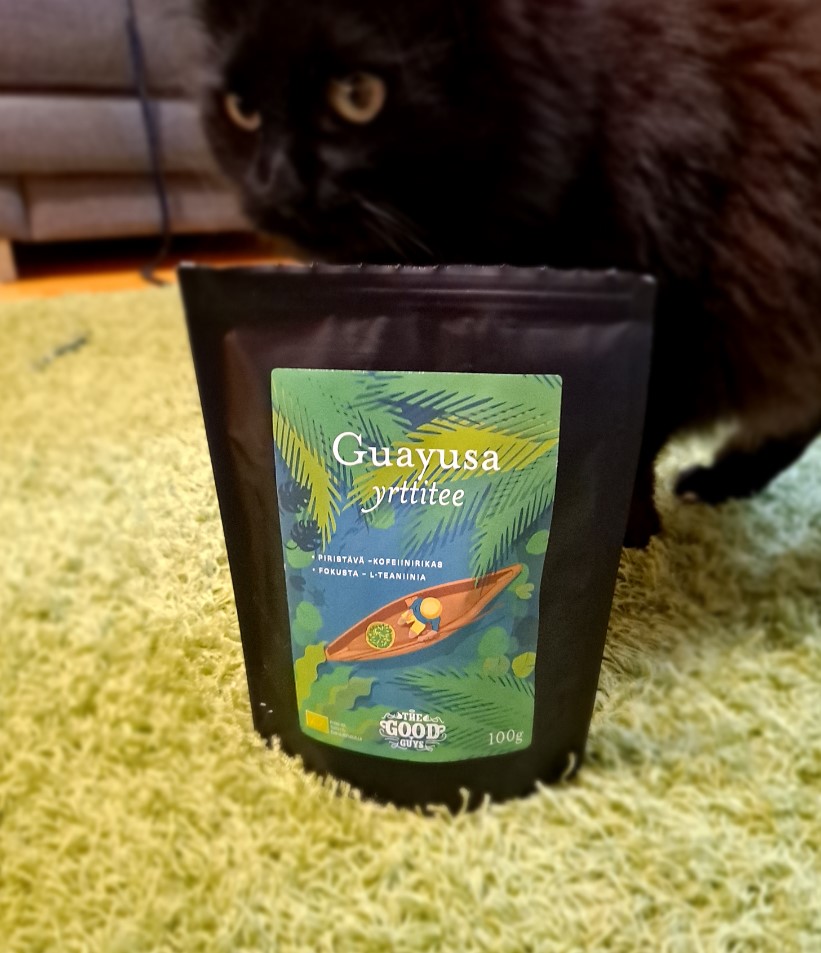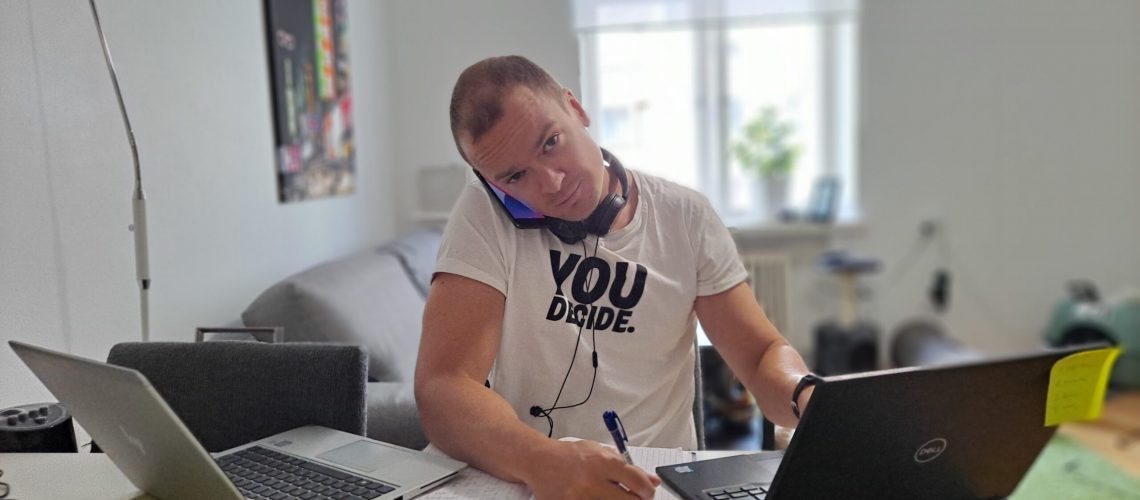Summer holidays are over, so it’s back to the grind. I will start August with a challenge – The idea is to incorporate different habits to ensure a productive and healthy month.
I got the idea from listening to Huberman lab podcast episode 28. Many of the listed habits here are from that episode, but not all of them.
I have the following goals:
In a picture summary, challenge will look like this:

Table of Contents
1. Morning habits
1.1 Drink water with a little bit of sea salt
After waking up, I will drink 0,5l – 1l water with half a teaspoon of sea salt. The idea is to do this every morning.
Reasoning: Hydration is essential for mental performance. Neurons in the brain need sodium, magnesium, and potassium. We are hydrated in the morning (7-10 hours without drinking water). It’s important to use natural sea salt, so it contains all the necessary minerals.
Where did I get the idea: Huberman lap podcast episode 28 (with correct timestamp)
1.2 Get sunlight
After drinking water, I will head out to get sunlight. It will be either walk or run, minimum will be 2 minutes, 10 minutes is solid and 30 minutes excellent. It’s important not to wear sunglasses.
Reasoning: Dr. Huberman argues that getting sunlight in the eyes first thing in the morning is vital for mental and physical health. It promotes metabolic well-being, positive functioning of the hormone system and supports good mental health.
Sunlight stimulates certain neurons in the eye that tells the brain it’s morning and it’s time to be alert. This will trigger numerous actions in organs and cells. One of the most important functions is to get the short pulse of cortisol that promotes wakefulness and a good immune system.
Where did I get the idea: Huberman lab podcast episode 28 (with correct timestamp)

1.3 A few physical exercises to strengthen the weak points in my body
I went to a physical therapist this summer as I was having some back pain. My current training routine has some weak points as it doesn’t involve all the muscle groups. I will strengthen the weak points in my body to ensure a healthy future.
Even though this is not directly connected to productivity, I want to include it here as a healthy body equals a healthy mind.
Reasoning: Physical therapist inspection revealed that I need to strengthen my upper abs and gluteus muscle. I will perform two particular exercises daily to strengthen these weak points. This will take approx. 5 minutes daily.
Where did I get the idea: Physical therapist
1.4 Hypnosis (10 minutes)
Meditation, yoga, and hypnosis are considered nonsleep deep rest. I am very familiar with meditation but haven’t tried hypnosis. There’s a free app called reveri (Reveri.com) that offers different hypnosis exercises. I will do it daily for 10 minutes in the morning.
Reasoning: According to Dr. Huberman, hypnosis has been shown by the greatest number of scientific studies to promote deep relaxation, heightened focus but also accelerate plasticity and learning within the brain.
Where did I get the idea: Huberman lab podcast episode 28 (with correct timestamp)
1.5 10 ideas listed every day
I read James Altucher’s book Skip The Line this summer. One chapter was titled “Exercise the possibility muscle.” The basic premise is to list 10 ideas a day (business ideas, book ideas, article ideas, ideas for other people, etc.)
Reasoning: There are many benefits to daily idea brainstorming. First of all, it will exercise the possibility muscle, thus increasing your creativity and, according to James, also giving you a dopamine boost. I have already tried it a few days, and you definitely feel good after listing 10 ideas.
It’s not easy to list 10 ideas, especially good ideas. But the idea is not to produce 10 solid ideas every time; the exercise itself is the key. Still, if you write 3650 ideas a year, maybe a hundred can be useful and few true gems.
You can also share your ideas which might give you new opportunities and connections.
Where did I get the idea: From James Altucher book Skip the Line

1.6 Cold shower
I have been doing ice-cold showers on-off for over 5 years. A few years ago, I had a December challenge to do a cold shower every morning. This summer, I have been enjoying cold showers almost every day as it’s been an incredible heatwave here in Finland. I will do a cold shower each morning before work for few minutes.
Reasoning: We can divide cold therapy benefits into mental and physical. Here I will focus only on the mental part. There’s something magic about cold showers.
Regardless what is your mental state before the shower, you will feel good and energized afterward. I also noticed that I get good ideas into my head during the shower or straight after. It’s an excellent natural energy boost before the workday.
Lastly, it’s not always easy to go to the cold shower; you need mental strength. This habit will exercise the mental strength muscle.
Where did I get the idea: To be honest, I don’t even remember
1.7 Guayusa Tea 90 minutes - 120 minutes after waking up
I’m not a coffee drinker, and I’m fairly sensitive to caffeine. There’s been lots of discussion on caffeine and l-theanine, how they balance each other. I drink tea every now and then but not regularly. I want to test if tea with caffeine and l-theanine will increase my productivity.
Reasoning: Dr. Huberman states that a mid-day crash happens easily if you drink coffee/tea straight from waking up; instead, you should drink it 90 minutes – 120 minutes after waking up to have nice consistent energy throughout the day.
I’ll choose Guayusa tea. It has caffeine and l-theanine in it. According to one study, guayusa will stimulate the release of epinephrine less than green coffee or coffee [1]. This suits me as I get easily jittering feeling from caffeine.
There are also many interesting studies on combination benefits from L-theanine and caffeine [2] [3].
Where did I get the idea: Huberman lab podcast episode 28 (with correct timestamp)

1.8 Final words about morning habits
Completing the morning habits is definitely the most challenging part of this challenge. There are quite many of them, but overall it will take approx—35 minutes to 1 hour.
2. Day time habits
2.1 Intermittent fasting (approx. 17 hours)
I have tried intermittent fasting before, but not many days a row. Now I will do it 31 days a row. I will be approximately 17 hours in a fasted state (+-2 hours). I will break my fast with a multivitamin smoothie 15 minutes before lunch.
Depending on the activity level of the day, lunch can be salad or more carb-heavy.
Reasoning: I have noticed improved focus in mornings with fasted state, so this will be essential for habit for august. Dr. Huberman discusses this also in his podcast. Fasting increases epinephrine (yes, the same hormone as coffee increases), but levels are more optimal to support focus and learning, not stress and panic that too much epinephrine can cause.
There are also interesting studies on intermittent fasting (although I would hope for bigger sample sizes):
Eight weeks of intermittent fasting decreased fat mass compared to the longer eating window. However, the same study concluded that in the intermittent fasting group, testosterone dropped significantly, but that didn’t affect strength or muscle levels [4]
Intermittent fasting may also lower blood pressure and blood glucose levels, although more studies are needed [5]
I don’t usually like to link mice studies, but the latest research concludes that intermittent fasting in mice effectively promoting long-term memory retention. Same researchers now hope to recreate this study with human participants [6]
Where did I get the idea: Huberman lap podcast episode 28 (with correct timestamp)
3. Evening habits
3.1 Large meal (compared to lunch) with starchy carbohydrates
This is not a new habit for me; I have usually eaten larger meals in the evening. I was happy to see that it’s also Dr. Huberman’s tradition. Still, I probably haven’t done it for 30 days straight.
Reasoning: Dr. Huberman highlights the importance of starchy carbohydrates and how they will increase serotonin, which helps transition to sleep. They will also replenish glycogen stores which is important as I exercise 5-7 times a week.
An example meal would be fish or meat with rice, potatoes or even wholewheat pasta and vegetables.
Lastly, a large dinner must be eaten 3 hours before bed, 4 hours in an optimal situation.
Where did I get the idea: Huberman lab podcast episode 28 (with correct timestamp)
3.2 1000 mg of EPA with dinner (Omega 3)
I have been supplementing with fish oil or krill oil before but not as much as 1000 mg of EPA.
Reasoning: Dozens of studies have shown that Omega 3 fatty acids will support a healthy mood and even act as antidepressants (especially the EPA form of the fatty acid). [7] [8] [9]
This is pretty amazing and should be known worldwide. Compared to antidepressants, there are no harmful side effects with EPA. [10]
Where did I get the idea: Huberman lab podcast episode 28 (with correct timestamp)
3.3 Evening Sunlight before bed
Like in the morning, the goal is to get 5 to 30 minutes of evening sunlight.
Reasoning: Viewing bright lights can be harmful to sleep in the evening. However, natural sunlight (when the sun is going down) is actually helpful. It supports correct melatonin rhythm, but it can also mitigate the negative effect of artificial lights in the evening.
Where did I get the idea: Huberman lab podcast episode 28 (with correct timestamp)
3.4 Magnesium Threonate before sleep
I have been supplementing with magnesium a lot but haven’t heard threonate before. It will be interesting to see if it has any effect on my sleep. I will take 300mg-400mg a day.
Reasoning: Magnesium threonate differs from other magnesium forms, as it haves transporters that cross the blood-brain barrier more efficiently than other magnesium forms. It will also promote the release of GABA (neurotransmitter), which helps relaxation, which is good before bed.
Where did I get the idea: Huberman lab podcast episode 28 (with correct timestamp)
4. All day habits
4.1 Work productivity methods (whitenoise & Screen above eyes)
How will I enhance my productivity during work time? I will use 2 simple methods—a low level of white noise and a screen above the eyes.
Reasoning: Whitenoise contains all the sound frequencies, but it’s mixed up randomly, and there’s no structure for it. Interestingly, it can improve learning and workflow. It can also increase dopamine which is associated with pleasure, but also motivation. There are many different white noise tracks in youtube examples.
It’s a good idea to have a computer screen above the eyes, so you have to look upward. This eye position will create a state of heightened alertness.
Where did I get the idea: Huberman lab podcast episode 28 (with correct timestamp)
4.2 Reading news only once a week
I will read the news only once a week. To make sure this happens, I will use the Freedom.to app for it (both on the computer and mobile phone). I will also limit my social media time – I will use social media only for blog-related stuff. Science/work-related news I’m allowed to read as it’s connected to my work/blogging.
Reasoning: I like to read the news, but I have been wondering about the effects on the mind that news has. What are the benefits and negatives?
Does it matter what is the daily COVID case amount here in Finland? Does it matter what happened in the USA or Japan? If it’s really important, I will hear it from my girlfriend/family/friends.
There are good articles about the negative effects of reading news too much [11] [12]
Where did I get the idea: I’m not sure, but I have been thinking about it for many years. James Altucher also discussed this in his book.
5. Quantifying the metrics for the challenge
How will I analyze the challenge after it’s over? Productivity is the main focus, but it’s harder to quantify. There are 4 major streams where I want to make things happen:
1. Work life
I will give my subjective analysis after the challenge is over – Did my productivity increase?
2. Blog
How many blog posts did I publish in August? (And how many words)
How much audience did I get in August? (How much did I market my content?)
Did I get new contacts/collaborations?
3. Toastmasters
I will participate in toastmasters meetings and give speeches according to the toastmaster’s curriculum. In addition to this, From July 2021, I’m vice president of education in Stadin sanasepät (Toastmaster club here in Helsinki, Finland). This means additional work for the club.
How many meetings did I participate in?
How many talks did I do?
4. Calisthenics
I love calisthenics, and it will always be part of my life. My goal is to exercise 5-6 times a week. In August, I want to focus more on handstands!
5. Other
How many books did I read?
How many educational podcasts did I listen to?
Quantitive metrics
Morning blood pressure – Especially interesting for intermittent fasting
Nighttime and daytime HRV – How are my recovery and daily stress in this challenge?
24 / 7 glucose levels – How does intermittent fasting affect my glucose levels?
Sleep metrics – How is my sleep throughout the challenge
Weight, fat percentage, and body composition – How are my body metrics? Does intermittent fasting have any effect?
Mobile phone usage time – How much less do I use my mobile phone in August comparing to other months?
Subjective metrics
Happiness level – Most important metric of all – How happy I’m during the challenge?
Motivation level – How is my motivation level compared to other months?
6. Closing words
I will try to keep the same wake-up & bedtime throughout the challenge – The idea is not to burn myself out or do extra work in the night. The key is to be productive in the morning and daytime.
And for my reader, if some of the habits caught your attention, try them out too in august, and please tell me how it went!
Remember to subscribe to my email list to get updates after the challenge is over. Thank you and see you next time!


This Post Has 4 Comments
Dude! Awesome regimen!
I’m really curious how it will work out for you.
Some ideas:
Try fasting for a longer period. I’m now trying a 24 hour fast. Based on my multiday fasts I’ve noticed an increased uptake in my focus at the end of the day, whereas normally I feel sluggish around 4pm.
On that same note, maybe try a Keto diet. I think the focus comes from being in ketosis (not sure however).
Ending the day with gratitude. I think a lot of positive psychology papers have shown that ending the day with gratitude can really alter your mood (however I think it’s more for people who think negatively, so if you don’t have that problem, maybe it’s not something that will move the needle).
I also thought about taking my 1000 mg EPA during lunch, to have the positive effect kicking in at the afternoon, what about that?
I also liked turning lights above your head off during the evening (to recreate a sunset feeling by keeping the lights low).
And maybe also something to try out (while probably not noticeable in your metrics), taking 10 minutes a day just staring out of the window (so no distractions like your phone or laptop). It works wonders for your creativity.
Good luck, and I can’t wait for the results!
All the best,
Tim
Hi Tim, and thank you for the good comments!
– Fasting longer
I have also noticed improved mental focus with a longer fast. My normal days involves 1-1.5 hour calisthenics session, so I don’t want to extend my fast there but off days I could incorporate more 24h fasts.
– Keto
I haven’t tried keto, so that could be an interesting experiment (and challenge)
– Gratitude
Yes, gratitude is a big one! We do it together with my girlfriend before sleep: three things we are grateful for that day.
– 1000 mg EPA
Interesting thought, I will test if I see any benefits switching it up
-turning lights off the evening
Good point!
-Window staring
I like the idea, will try it out!
Thnx mate!
Btw, I came across this one, you must love it too 😁
https://www.linkedin.com/feed/update/urn:li:activity:6830572259992707072/
About the gratitude: Another one which I heard in a parenting book (Hunt, Gather, Parent) was ‘being in “awe”‘. I’m not 100% sure if it translates correctly, but they said that when you’re angry (or a child) you should focus on something that amazes you. E.g. how technologically advanced we are. And this ‘awe’ will vanish your anger straight away.
Which made me think, couldn’t you also do that at night, next to the gratitude, to think about something that amazes you 😇
How’s the experiment going btw?
Cheers,
Tim
Hello again Tim
very interesting sleep mask!
Not familiar with the awe word but I get what you are saying and that’s good point. Ex. feeling of road rage but instead of being angry, start thinking about how amazing invention the car is, you can go fast from point A to point B.
The experiment is going great, I have achieved flow state more than before (in the mornings). I will definitely keep doing IF and most of the habits. Digital hypnosis (reveri.com) is not working for me though.
2 more weeks to go!
-Ilmo